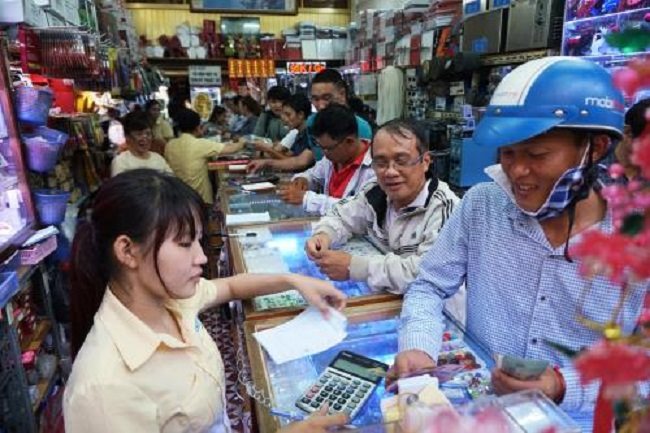|
Speaking at a teleconference which tabled the draft of the revised Enterprise Law for debate on Thursday, Deputy Cao Dinh Thuong from the northern province of Phu Tho said legalizing this type of household businesses would be akin to “skipping stairs” as they are different from enterprises in nature, according to local media reports. Instead, they form a distinctive business model, he said, adding that the legal conversion may create more confusion and bureaucratic hurdles, thus posing obstacles to their production and business operations. Mai Sy Dien, deputy head of the legislative delegation in Thanh Hoa Province, about 150 kilometers south of Hanoi, stressed the need to introduce a law which aims to govern this type of entities. “There are over five million household businesses [in the country], but only 1.7 million of them are paying taxes,” said Dien. He said the proposed Enterprise Law remains lacking in regulations which will safeguard their legitimate rights and interests. On the same note, Nguyen Van Canh, a deputy from the south-central province of Binh Dinh, pointed out a slew of impracticality that would ensue if this business model was instantly governed by the Enterprise Law. It would take more time for lawmakers to examine the impact of the proposal, according to Canh. He said the current proposal only addresses issues concerning state management among household businesses, but it fails to recognize their rights and interests. According to several lawmakers, the proposal may entail more risks and costs for household businesses. Also, there are no rules that help improve their freedom, environment and security issues. Support behind proposal
Deputy Vu Tien Loc, who is a lawmaker in the northern province of Thai Binh and serves as President of the Hanoi-based Vietnam Chamber of Commerce and Industry, threw his support behind the proposal to put household businesses under the revised Enterprise Law. “Maintaining the status quo of household businesses will be no longer reasonable. They should be regarded as a type of sole proprietorship, as part of our economy,” said Loc. Turning household businesses into sole proprietorship does not equate “turning owners [of household businesses] into directors overnight,” he added. The move is not meant to hinder household businesses, but to aid them, according to the legislator. He said they will benefit from prevailing regulations on state management, governance, tax declaration and payment, so they will neither incur costs nor go through bureaucratic administrative procedures. Authorities intend to legalize the role of household businesses so that they will be able to reap benefits and have access to support schemes from the Government, according to Minister of Planning and Investment Nguyen Chi Dung. Dung said once regulated in the revised Enterprise Law, household business will see reductions in barriers and administrative procedures, and the private sector will thus grow stronger. “The law will encourage households to develop into private companies if they are capable,” he said. The minister cited existing regulations as saying that a household business can only employ a maximum of 10 workers. However, according to the official, many household businesses are operating on a large scale, employing hundreds of workers and posting annual revenue worth thousands of billions of Vietnamese dong without being taxed like a normal enterprise. “This leads to the Government missing a huge source of income for the State budget,” he said. He predicted a new, separate law for household businesses would take up to three years. “If [the proposal] is beneficial, we should do it right away. This will only benefit household businesses,” he claimed. “Once we finish a new law for these entities, we can simply move these regulations to the new law – that’s it,” he said. Vietnam is home to around 5.5 million household businesses whose revenues account for around 30% of the country’s gross domestic product, according to the Vietnam Small- and Medium-Sized Enterprises Association. Data also revealed their total assets are worth VND655 trillion (US$28.1 billion) while their total revenue is estimated at VND2.2 quadrillion, and tax payments are worth VND12.36 trillion. Such businesses employ more than 7.9 million people across the country.SGT |
||||

Setting rules for household businesses poses questions
Regulating household businesses in Viet Nam is posing several problems as lawmakers debate whether the rules should be included in the amended Law on Enterprise or developed into separate legislation.
 Several deputies of the legislative National Assembly have expressed their disapproval over a proposal to convert around five million household businesses in Vietnam into enterprises legally.
Several deputies of the legislative National Assembly have expressed their disapproval over a proposal to convert around five million household businesses in Vietnam into enterprises legally.
